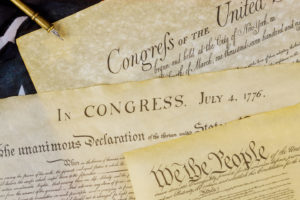‘You can’t fix what you don’t understand’: New study raises more worries about America’s civics literacy
A new survey found 70% of Americans would fail a basic civics literacy quiz.
The survey by the U.S. Chamber of Commerce of 2,000 registered voters found while two-thirds of voters said they…

A new survey found 70% of Americans would fail a basic civics literacy quiz.
The survey by the U.S. Chamber of Commerce of 2,000 registered voters found while two-thirds of voters said they studied civics in school, just 25% of respondents said they are “very confident” they can explain how government works.
“As we approach our semiquincentennial in 2026, this report amounts to a five-alarm fire drill for the civic health of the nation,” said Hilary Crow, vice president at the U.S. Chamber of Commerce Foundation. “While Americans across backgrounds value civic participation in theory, we are sorely lacking in the basic knowledge that translates values into informed, engaged citizenship.”
The survey comes even as data shows civics curriculum for current students is failing, too.
Civics scores among 8th graders in the United States dropped significantly between 2018-2022 in the National Assessment of Educational Progress (NAEP) test.
In addition to cratering civics results, history test scores are also declining.
“For U.S. history, I was very, very concerned,” said Peggy Carr, the commissioner who oversees the NAEP. “It’s a decline that started in 2014, long before we even thought about COVID. This is a decline that’s been [going] down for a while.”
The 2022 history results were the lowest in the last 28 years, said the 74Million.
States such as Florida and Wisconsin have proposed comprehensive civics reform that emphasizes civic pride and patriotism in order to make civics lessons more impactful.
“The data is showing that clearly we are missing the mark,” said Wisconsin state Rep. Amanda Nedweski, R-Pleasant Prairie, about civics education. She cited especially the “misunderstandings over the last couple of years about how elections work” as a glaring example of where civics education has been falling short.
Parents agree with Nedweski.
A survey of 1,054 parents by the Jack Miller Center found 86% of them think current civics teaching is inadequate, while 71% think that kids aren’t getting an honest picture of the history of their country at school.
The U.S. Chamber survey, a broader measure of opinion, found that only 46% of respondents believe the U.S. is performing well on the vital need to understand our system of government even as 95% said it’s important for the nation’s success.
Other findings include:
- One in three did not know there are three branches of government;
- More than half did not know the number of members in the House of Representatives;
- Just half were able to correctly name the branch of government where bills become laws;
- More than 75% of adults in the U.S. view political division in the country and government as a major problem.
The Chamber’s Crow said it’s very difficult for Americans to understand what needs to be done to reform government when they don’t understand how their government works.
“Put plainly, you can’t fix what you don’t understand,” said Crow. “Without reversing these deficiencies in understanding how our government works, we are risking the long-term health of our civic culture and democracy itself.”
Some bright spots in the Chamber survey are that only 19% of those surveyed feel political tensions at work, with 80% holding positive views of large and small businesses.



